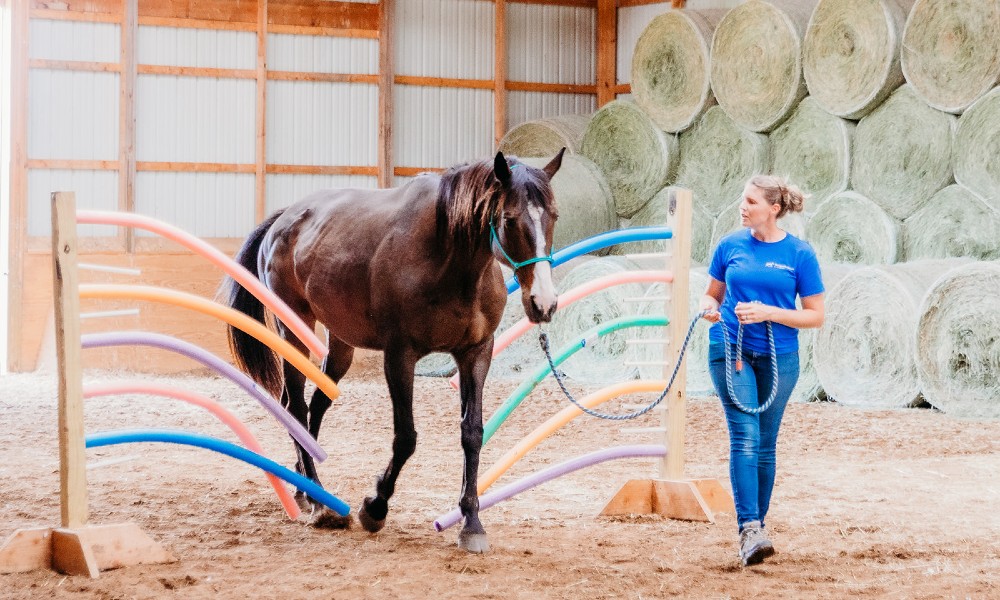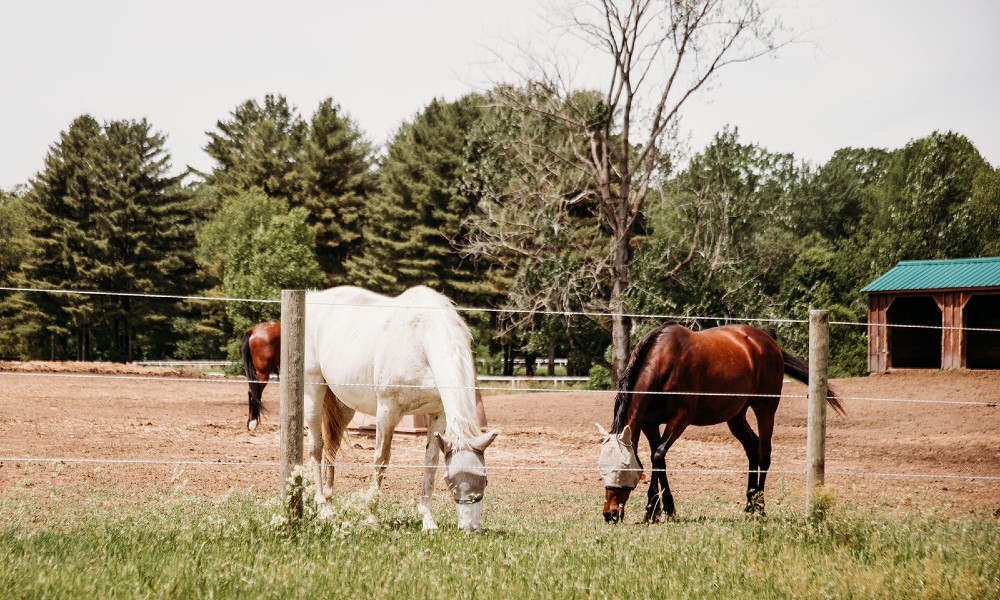The 27 acres of farmland owned by Therapeutic Horses of Saratoga (THS) are alive with memories from four years’ worth of heart-lifting work involving some very special retired racehorses. One standout equine was Boots, who is now buried near a cluster of trees behind a therapy paddock. Even though it has been several years since the retired Standardbred racehorse passed away, her presence can still be felt in every corner of the farm.
“She was the mayor of the farm,” says psychologist Dr. Erin Christopher-Sisk, founder of the Saratoga Springs nonprofit. “Boots had chronic pain from an infection in her hooves that caused permanent damage. She became part of our therapy program, and patients with chronic pain really connected with her, and she connected with them. She was such an inspirational presence on the farm. I spend time at her grave with patients, and I can still barely talk about her without crying.”
Founded in 2018, Therapeutic Horses of Saratoga rescues retired racehorses like Boots and retrains them for therapeutic programming. THS works in partnership with certified equine therapists who provide equine-assisted therapy to the community’s most vulnerable populations. I’ve actually volunteered with the program after my niece, a former foster child who’s lived through a lot of trauma, found so much comfort through a similar program in the Pittsburgh area.
A Saratoga Springs native, Christopher-Sisk grew up just blocks from the Saratoga Race Course and mastered the art of reading a racing form by the age of 8. Although she has fond memories of summer days spent at the track, her knowledge of horses was minimal at best. She certainly never imagined she would one day be overseeing a horse farm.
The Siena College graduate earned a PhD in counseling psychology from University at Albany and is the founder and clinical director of ECS Psychological Services, a Saratoga Springs–based mental health practice. In 2004, Christopher-Sisk and her husband, James Sisk, owner of Barrier Free Elevators Inc., purchased a house in Saratoga. After developing a friendship with their next-door neighbor, a horse trainer, the couple took advantage of an opportunity to invest in a racehorse he was purchasing. For Christopher-Sisk, that decision would end up changing the course of her professional career.

In the years that followed, they invested in more horses, including Broadway Straight (“George”) and DW’s Regal (“DW”). When George and DW suffered career-ending injuries that made it unlikely that they could ever be ridden again, finding them a new home proved difficult.
“After discovering that there were no great rehoming options for horses with injuries—especially those that can’t be ridden—I decided to keep them and fold them into my work as a psychologist,” Christopher-Sisk says. “We found a farm owner in Galway who was willing to let us board them and allow me to tinker around with using them in therapy. I had already been using my dogs in my practice, and I applied the same principles with the horses.”
At the time, the field of equine therapy was only just beginning to develop in the United States. With no tried and true therapy models to draw upon, Christopher-Sisk began developing her own. She brought patients to the farm and allowed them to groom and interact with George and DW. Almost immediately, she realized that she had stumbled onto something big.
“I started to see success pretty quickly,” she says. “People had less anxiety, less depression and reported feeling noticeably better. They loved it, and the horses loved it.”
The therapeutic benefits were so significant that she began training other therapists on her staff to work with George and DW. It was only a matter of time before she and her husband decided the time had come to find a horse farm to call their own.
In 2015, after years of searching for a location that could accommodate both horses and clinicians, they purchased a 27-acre property at 683 Lake Avenue (NY-29), just 10 minutes from Saratoga Race Course. The property contained an 11-stall horse barn and a small house that they converted into an ECS therapy office.
Christopher-Sisk laughs when recalling their early days of farm ownership. “We had no clue how to run a farm and made a lot of mistakes along the way, but making sure our horses were cared for was always our number one priority,” she says. “We leaned on our horse trainers for help and made a lot of friends in the industry. Cornell Cooperative Extension was also a huge resource for us.”

Three years later, in 2018, THS was established as a nonprofit. The organization now has six employees and a team of about 30 dedicated volunteers.
According to Christopher-Sisk, obtaining funding has been their biggest challenge. “We are not expert fundraisers, and we are still learning how to do that,” she says. “For the first several years, my husband and I funded about 90 percent ourselves. We fund a little less each year and are now at about 50 percent. We have some private donors who have been very generous, and typically when we adopt a horse, the owner will make a sizable donation.”
THS primarily adopts retired racehorses that can no longer be ridden due to injuries, and its therapy herd has grown to include 11 horses. All horses receive specialized care from the THS team as well as from veterinarians, equine dentists and farriers.
As part of its mission to serve the community, THS also provides free boarding to the Saratoga Police Department’s three horses. The farm is now at full capacity, and in order
to adopt more horses, the organization must raise funds to
build additional paddocks.
As for THS’ equine therapy model, it has evolved over time through a combination of education, specialized training and trial and error. Horses are never ridden during a therapy session.
“Patients go into the paddock and engage in an activity that is specifically planned based on issues they are struggling with,” Christopher-Sisk explains. “For example, with a child who is being bullied at school, we might use horses that are a little more in your space and that are harder to communicate with. If you can communicate with a 1,000-pound horse, you can also do that with a bully on the playground. It’s very empowering.”
Although THS works in conjunction with clinicians from ECS Psychological Services, the two are separate entities. ECS has a therapy office at the farm, and according to Christopher-Sisk, the mental health services they provide are needed now more than ever before.
“In my almost 20 years of being in practice, I have never seen the volume of need that we see and have seen over the past year-and-a-half,” she says. “Our mission has always been to keep up the needs of the community, so we just continued to try to hire therapists and expand staff. We were at seven or eight full-time staff members before the pandemic, and we are now at 21.”
In an effort to introduce their equine therapy model to a larger audience, THS will be offering specialized training to clinicians outside of ECS.
“My vision is to create a solid program that can be replicated by others throughout the country,” Christopher-Sisk says. “There is a need for mental health care everywhere, and there are horses everywhere that need a home. As a racehorse owner, I believe that if we are going to be part of this industry, we need to be part of taking care of the horses once their racing days are done.”
Running both a nonprofit and a clinical practice is no easy task, and Christopher-Sisk spends at least five days a week at the farm. It seems likely that there is no place that she would rather be.
“It’s such a delight for me to see the joy people get from working with horses as well as to see how much the horses enjoy being here,” she says. “It really is a sanctuary for both people and horses, and it just feels really good to be here.”



